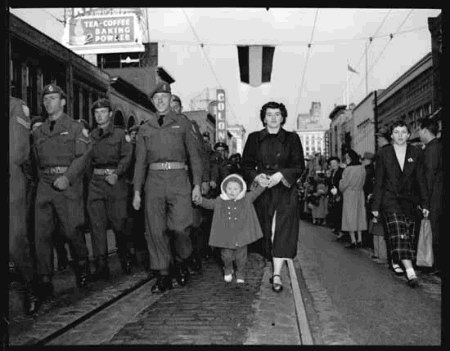EVENT

The USSR's first successful detonation of an atomic device in February 1950, and the onset of the Korean War in June of that same year, cast a shadow over the affluent, optimistic atmosphere of post-war Vancouver. With Cold War tensions being played out in a "hot" conflict just across the Pacific, Vancouver seemed imperiled once again by its proximity to Asia. As a result of the perceived external threat to the city, air raid sirens were tested regularly, and evacuation and survival plans were distributed to every household. Mayor Thompson addressed the issue of potential internal threats in his announcement that "all civic employees would be screened for Communist sympathies" (Macdonald 52). In the context of this internal battle against the "Red Menace," the entertainment industry also came under attack.
In the 1950s, Vancouver's booming nightclub scene was rivaled by few. According to "night-beat reporter" Jack Wasserman, "Only in Las Vegas and Miami Beach, in season, were more superstars available in nightclubs" (Ross 2). It was the Golden Age of Striptease, and, from the "tasteful pasties and bejeweled g-strings" (Ross 2) featured in floorshows at Vancouver's upscale clubs to the raunchier displays offered in the Chinatown venues, sexually permissive entertainment was everywhere.
For those concerned with staving off the Soviets and their kin, the immoral world of nightclub entertainment was viewed as a sign of "the looming peril of cultural decline and communism" (Ross 3). The allure of striptease was perceived as a direct threat to the stability of the nuclear family, which was considered to be the very foundation of the capitalist society. As local historian and scholar Becki Ross notes, "Dancers in particular were harshly judged for abandoning (and mocking) the venerated matrix of stay-at-home, full-time marriage, wifedom, and motherhood" (Ross 2), to which all morally upright, anti-communist women were expected to aspire. However, as professional showgirl Choo Choo Williams, wife of Ernie King, points out, dancing enabled her to maintain her family life. She says, "I could be home with my kid in the daytime and then go out and dance at night" (qtd. in Greenwell 146).
Vancouver's entertainment scene provided refuge for Canadian and American performers who seemed to be at odds with the staunch anti-vice, anti-communist mentality of the day. Amongst these was guitarist Jim Johnson, who made his home in Vancouver after having been forced to leave St. Louis, Missouri, during the McCarthy era. Together with bassist Harry Aoki, he hosted the locally produced CBC TV series entitled "Moods of Man" (1968). This show featured a wide range of music, from folk to blues to classical, and showcased guests such as Eleanor Collins and Doug Parker.
In the 1950s, Vancouver's booming nightclub scene was rivaled by few. According to "night-beat reporter" Jack Wasserman, "Only in Las Vegas and Miami Beach, in season, were more superstars available in nightclubs" (Ross 2). It was the Golden Age of Striptease, and, from the "tasteful pasties and bejeweled g-strings" (Ross 2) featured in floorshows at Vancouver's upscale clubs to the raunchier displays offered in the Chinatown venues, sexually permissive entertainment was everywhere.
For those concerned with staving off the Soviets and their kin, the immoral world of nightclub entertainment was viewed as a sign of "the looming peril of cultural decline and communism" (Ross 3). The allure of striptease was perceived as a direct threat to the stability of the nuclear family, which was considered to be the very foundation of the capitalist society. As local historian and scholar Becki Ross notes, "Dancers in particular were harshly judged for abandoning (and mocking) the venerated matrix of stay-at-home, full-time marriage, wifedom, and motherhood" (Ross 2), to which all morally upright, anti-communist women were expected to aspire. However, as professional showgirl Choo Choo Williams, wife of Ernie King, points out, dancing enabled her to maintain her family life. She says, "I could be home with my kid in the daytime and then go out and dance at night" (qtd. in Greenwell 146).
Vancouver's entertainment scene provided refuge for Canadian and American performers who seemed to be at odds with the staunch anti-vice, anti-communist mentality of the day. Amongst these was guitarist Jim Johnson, who made his home in Vancouver after having been forced to leave St. Louis, Missouri, during the McCarthy era. Together with bassist Harry Aoki, he hosted the locally produced CBC TV series entitled "Moods of Man" (1968). This show featured a wide range of music, from folk to blues to classical, and showcased guests such as Eleanor Collins and Doug Parker.
PHOTO GALLERY
Click on thumbnail for larger image

BIBLIOGRAPHY
Allan, Blaine. "CBC TV Series 1952-1982." Queen's Film. Home page. 27 Jan 2008. http://www.film.queensu.ca/CBC/Med.htmlAoki, Harry. Personal Interview with Alan Matheson. Vancouver, BC. 2 Aug. 2006.
Greenwell, Kim, and Becki Ross. "Spectacular Striptease: Performing the Sexual and Racial Other in Vancouver, B.C., 1945-1975." Journal of Women's History 17.1 (2005): 137-164.
Macdonald, Bruce. Vancouver: A Visual History. Vancouver: Talonbooks, 1992.
Ross, Becki. "Men Behind the Marquee: Greasing the Wheels of Vansterdam's Professional Striptease Scene, 1950-75." The Striptease Project. 2008.








